Hey, guys, it's Scott.
It is Tuesday, May 30th, but you will probably hear this on Wednesday, May 31st because it is late. It's my fault, not Tyler's, the greatest assistant ever. Full disclosure, Emmett has a chance to try out for a baseball team tomorrow and I was setting that up this afternoon. He's really excited. He's never really played on a team before and it might not go well, who knows, but his super close friend is on the team and Emmett has been maniacal about practicing baseball over the last year. We go out and throw a ball around pretty much every day and I took him to the batting cage over the weekend.
Again, he's been taking lessons. I don't know what it is, he just fell in love with this game. First, this statistics and history of it. He's one of those kids that consumes facts. and then he really wanted to get good at playing it. He's not the most sort of athletic or naturally coordinated kid, but he really picked it up. So I'm proud of him, but that was my early day. And the weekend was really interesting. The whole theme of this post, I keep thinking about, is sort of endings and beginnings, closure, and circularity, because for Memorial Day, on a on a personal level, I went up to my old alma mater. I went up to Brown for my college reunion. But really, it was a father son trip to take with Jack, our 16 year-old. I didn't know anyone going except one of my best friends who I knew all the way from high school through college, Dante, who I've posted pictures of before and you've seen us hanging out if you followed me over the years.
So I didn't really know anyone going. I did wind up bumping into some people that I had been close with in college and I was really excited to reconnect with them after 20 years or so. But the point was to take a trip with Jack and to let him see a college. We haven't gone on any trips for colleges yet. he's only a sophomore, but to see a school that was in a city but still had a campus and just to show him where I went to school.
And again, to be totally transparent, he was not into it at first, because he does well in school and he's an incredibly sweet and outgoing and wonderfully well-adjusted and happy kid. He's really creative, we’re working on By a Thread, he runs the writing club at school, I mean, he's super into creative writing and wants to do that and all that. But he can be that kid that hangs out with his friends a little too much instead of studying, or thinks he has it and he studied enough when he hasn’t, and I always say he worries a little bit too little while Emmett, our 12 year-old, worries a little bit too much. Anyway, he does well and I'm super proud of him, but it's probably not a school that he would either want to go to or it would be a reach for him, like it would be for anyone at this point. It's different than when I went there, but still. So he was kind of like, “why are we going there? You're just going to show me a school that's all the good times that you had when I probably can't get in.”
And so the first couple hours on the road were a bit rough, but I was trying to explain to him, “I'm not taking you there to be like ‘this school was where I want you to go.’” But instead I was trying to show him that this is a school where I spent part of my life. And one of the funny things was that going here I realized how it was sort of up and down for me at a lot of times, like I had a really rough first couple of years or first year. I missed my high school girlfriend, I didn't get along with my roommate, all that stuff. But it was my first real brush with depression, like real depression and anxiety and I didn't know what was happening. And so one of the interesting things taking Jack there was that I think he picked up on it pretty quick that it wasn't all roses, it wasn't something where college was this amazing time. There was a lot that I loved about it, and I've made friends and I'm still close to and I'm glad that I went where I went. But he understood the point of the trip was just showing him it's important to pick the right school for you and to know yourself.
And I think there was a lot of pressure I put on myself when I went to college to just go to a great school back then and that that would help me become a writer. But the writing program there at that time was really experimental, honestly. This guy Robert Coover (who was a big writer in the ‘60s) and Carole Maso really believed that the internet was going to change writing entirely, and it was going to be nonlinear and it was going to be circular and there'd be links and stories to take you from one page to the next and it would break all of Western narrative. And so they really wanted a lot of us to write these things called ‘hypertext’ where it was like that and was always pushing the boundaries of linear narrative. And I just wanted to write stories. So I didn't even get into the writing program until I was I think, a junior. So the point is, Jack picked up on it quick and it wound up being a really nice trip where he saw it was a school that I liked a lot of things about and also a school that had issues with, and so it made him I think, a little bit more excited to look at schools carefully and figure out what he wants and who he is.
But it was also just strange being there with my son and being like, I was his age when I started looking at colleges. And to see friends that I hadn't seen in 20 years, and one of the funny things about that is that friends from all the way back then, even if you haven't seen them or spoken to them, you often can just pick up where you left off. And it got me thinking about how a lot of that is because they knew you when you were this raw bundle of nerves, right? And over the years you mature or you don't. But you grow layers, you grow ways of mitigating a lot of the things that are your more embarrassing or unbridled impulses and worries and hopes and all of that kind of stuff. You become a person with protective layers and a lot of that's really good. You become a mature person, you become someone who can navigate the world probably a lot more deftly. But they knew you, they saw you at your core.
And whether or not you've become better than that, whether you become worse than that, whether you've just become different, they still know you. They know those things that you've reacted to, good or bad, built on, built away from, given into. And so there's a connection with friends like that, or girlfriends from back then, significant others from back then, boyfriends, whatever. They saw you when you were still forming. And now at the end (not the end of your journey, it's not the end of your life, but at the end of the trajectory so far) there's just a circularity to it, where it's like, they immediately knew who you were then. They see who you are now and it makes sense. I see a friend like Dante, I see a friend like this guy Lee, who I hadn't seen in 20 years, and he's a doctor. But who he is makes perfect sense to me, in a good way, he's become someone I think I'll really get along with and we're going to reconnect, given who he was back then.
And it just got me thinking about stories, too. It's such an odd moment. So this might be a clumsy transition, but away from my personal life into the stuff that I've been working on. But I'm at the end of a lot of the books for Comixology. I'm in the last issues. So even if you haven't read them yet, I'm writing the last issue and a half of By a Thread with Jack. I just wrote the last issues of Canary and Barnstormers and Dudley Datson recently. I'm in the last issue of Duck and Cover with Rafael, even though you haven't read the first one yet. Nocterra is coming to an end, we do hope to pick it up again after Tony works on this project of his own, Edenwood, which you should totally pick up. But it will go on hiatus for a while. So I'm in kind of a sea of endings. And one of the things that I love about endings is that a lot of the series of mine, I feel like I'll pick up again, like We Have Demons. I'm doing a new book that builds on a lot of the things that we didn't Clear it with Francis Manapal. I have a project that I'm working on on the side with Francesco Francavilla. And even if they're not the exact same characters, it's not the exact same series. Again, you're closing one thing to open a new chapter. I know I'll do more with Greg Capullo, I know I'll do more with a lot of the creators that I love. But even this thing was Rafa, Duck and Cover, it's sort of we close American Vampire, but we return to a lot of these themes and do something different with Americana and pulp and all this stuff.
And so it got me thinking about all these shows I've been watching too, recently. The end of Ted Lasso, the end of Succession, which was one of my favorite shows in years and I won't spoil it if you haven't watched it. The end of Barry, which I've just started watching so I'm excited to get to. For me Succession had a perfect ending. It was the closest thing to a perfect ending, it had the tiniest few things, which I won't bring up here, which I would do differently. But this thing I loved about it, without spoiling anything that happened, is that it's a return to the beginning. It's a distillation of the entire series in one episode where the characters, in terms of who they began as in a series like that, they either change or they return to who they were at the beginning in some way, in a way that's tragic. And I won't say what happens, but the point is, it had this perfect circularity. It was an ending that also brought you back to the beginning in all kinds of ways.
And one of these lessons in writing that I remember really glomming onto when I was young, when I was in my teens, that I thought was fascinating. I had a teacher that said, “the ending of a story is visible in its very first lines.” And I don't think that's exactly true. I don't think you can read the very first lines of a story or a comic and know the ending. But I do think by the end of the first scene, everything is sort of encapsulated, I really do. I think that a lot of the time my best endings, or the endings I'm proudest of, are ones that are telegraphed in the beginning. The ‘Gotham is… ’ elements of Court of Owls where you realize by the end, the whole story is about Bruce being humbled and realizing the Gotham is something unknowable.
It's big, it's history, it's a mystery. It’s everyone all at once. It's not just Batman, it's not knowable, and that makes him a better Batman, to prostrate himself before the history of the city itself, the size and the grandeur and the giant force of it. And so similarly, in American Vampire, Skinner's whole ‘breaking good’ trajectory is mapped out in the very beginning of his story where Book is telling him in a lot of ways (Book is sort of his counter) that even though Book thinks that Skinner can't be any better, what you learn is that Book is his surrogate brother and Book believes that Skinner should be better than he is. And there’s Pearl’s suggestion that maybe he made her for a reason, all of that stuff comes back.
And so the idea is that endings and beginnings have this strange, recursive relationship where they just keep writing each other. I just keep thinking about it in all kinds of ways, being at the end of things and starting new things and how the endings returned to the beginning, how the endings are written in the beginnings in the best stuff. And that's what I loved about Succession was that element, and once we're a little further away from it and I feel I'm not spoiling it for people I’ll say more. But as a writer, I'd say always think about that. Think about when you get to the ending of it, is it something that feels both surprising but inevitable because it was written in the beginning? It was there at the start. And that's what I mean in life. Like, again, so much of it is the cycles—going back to the place that you went to school, but now with your kid looking at the school, and having a different perspective on it, not seeing it through bleak glasses that you saw it through when you were 18, or rose-colored glasses that you might have seen it through 10 years ago, but understanding it in a different way and a more nuanced way. But seeing how all that stuff was present and my son's perception of it all at once. So all of that.
But yes, so a couple bits of housekeeping that I'm gonna answer one of your questions, not two, even though I have a list of them here. I don't want Ty to have to work too hard. We're already 15 minutes into this recording because I feel like I've been on the therapist couch talking to you guys about writing and my life and all of it. But we do have Book of Evil #3 out right now, deeply deeply happy with that book. I hope you'll check it out.
And we have Dudley #5, the conclusion of our all ages cosmic adventure series from me and Jamal Igle. Really proud of that as well.
And again, reminder, ad nauseam, but Barnstormers is up for an Eisner for Best Digital Comic. I'm extremely grateful to my incredible co-creator on that, Tula Lotay, for the work that she put in and how she was able to elevate that story and bring it to life. I really hope you'll consider voting for us if you are eligible, and we really appreciate it.
So I'm going to answer one of your questions, not two, because I feel bad that Ty already has a lot to transcribe. So the question is:
ChrisGooty asks, “Do you find it harder to write denial arcs or determined arcs? I'm realizing now that for me, it's harder to write a denial arc because it feels like the character is much more resistant to change, as if they are trying to stop the story from happening. Do you ever encounter this? How do you make your reluctant heroes not feel like they are being dragged around by the plot?”
What a great question. And I was thinking about this, I looked at it ahead of time. And I completely understand what you're saying. So a denial arc is an arc like in Court of Owls where essentially a character does not want to believe the things presented to them, they're almost trying to disprove the point of the story. A determined arc is where it's more conventional, they're trying to achieve something and trying to get something. So the difference is almost like most Disney films, Moana or Tangled or most action films, Terminator, anything, a character is trying to do something, they're trying to achieve something, they're trying to get something, they're trying to win something, prove something. But a denial arc is a character trying to resist a truth that's put before them. Horror stories often have denial arcs where characters are trying to prove that something can't exist, or trying to resist it from coming for them in some way rather than going after something. But what I would say is that the way that I make it active is that instead of having it be that the character doesn't want the story to happen, or is trying to deny the truth of something, try and set them on an active journey to disprove the thing.
So again, in Court of Owls, which is the one that just pops to mind because it's a big denial arc right in front of you, that Batman goes on a quest to prove that the Court of Owls cannot exist. So he's not taking in things that are presented to him and rejecting them. The story doesn't come at him, he goes out seeking to disprove this thing. So what I'd say is try and find a way of making your hero active and having them go on a quest to essentially undercut the thing you're trying to say in the story. And then the thing is like, when you think about it again in Succession, I would argue once you watch it, again, not spoiling too much, is almost a denial arc without saying what happens at the end. It's characters going after their father's legacy, wanting to inhabit it, wanting to take over the company that he built, and essentially denying the fact that none of them would enjoy that, be happy doing that, be good at that, all of it, when it's apparent from the very beginning. And that a happy ending in that series, regardless of whether it happens or not, theoretically in that series would be for them to walk away from the shadow of their father and try something else. So that is certainly in my mind a denial arc of a show. So again, my advice is to create an active quest that the character goes on to essentially prove that the thing that staring them in the face, the truth that staring them in the face, is not true.
So for paid subscribers, I have a really big treat for you. Instead of doing a half of this post that's just for you. I'm going to do a BAT CHAT, we'll call it, just because anyone that's ever worked on Batman, it's easy to call (the last Chat was with Chip Zdarsky).
But we're going to talk a lot about The Wake. It's going to be a live conversation with Sean Murphy this Thursday night at 9:30pm because The Wake is 10 years old, I just realized it because Ty again, the great assistant, told me a couple of weeks ago, I couldn't wrap my head around the fact that it was 10 years ago. But I figured to have Sean on talk a little bit about Batman, talk a little bit about our friendship, talk a little bit about The Wake and to try and continue the trend with other creators that I'm working with, even though I'm not working with Sean now. I’ll talk to other creators I have worked with and I am working with in the future too. So I’ll start a thing where for paid subscribers, every month or so we'll bring on somebody that I've done a book with, whether it's somebody I'm actively still working with, like Francis Manapul or Greg or somebody who I worked with, but we're not working together now or have plans to in the immediate future like Yanick Paquette or someone like that, who I adore, who's amazing, who wrote a whole score for our Swamp Thing, by the way, just because, and this is just a genius on many levels. And I’ll just start a series where I'm talking to creators that I've done stuff with in the past, or I'm doing stuff with now. And because it's the 10th anniversary of The Wake, I thought it would be a good time to talk to Sean.
So yeah, paid subscribers. It's never too late to sign up for just $7/month or $75/year, and you get everything we've ever done with our class, the entire archive of 20+ classes so far, access to things like this, the second half of all of our posts, you get to send your books to me once a year (two books to be signed, free of charge, you just pay shipping). You get to skip line at cons like San Diego, which is coming up, and all kinds of stuff. So give it a shot. We'll have a lot of fun this week. And have questions ready in the comments here, because we're going to chat with you as well. Bye!
S
P.S. Here’s some Quinn as Batman for the road:
And here’s something that made me smile:

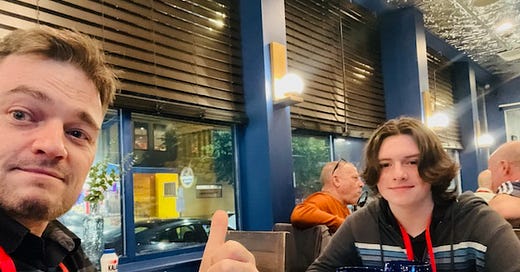
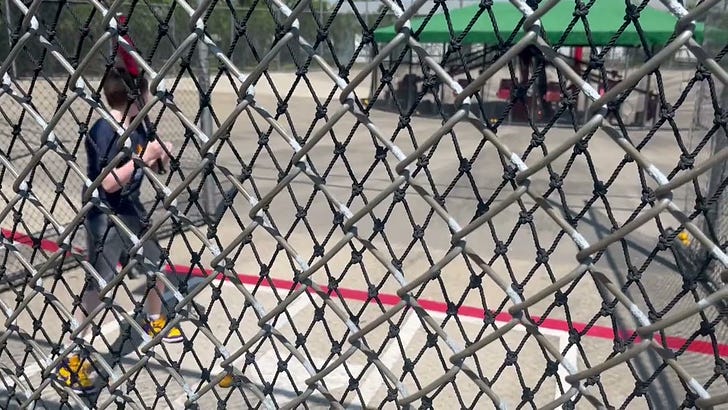

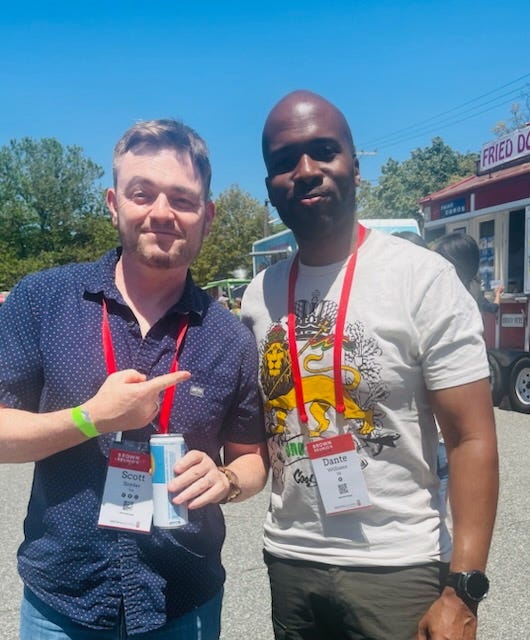

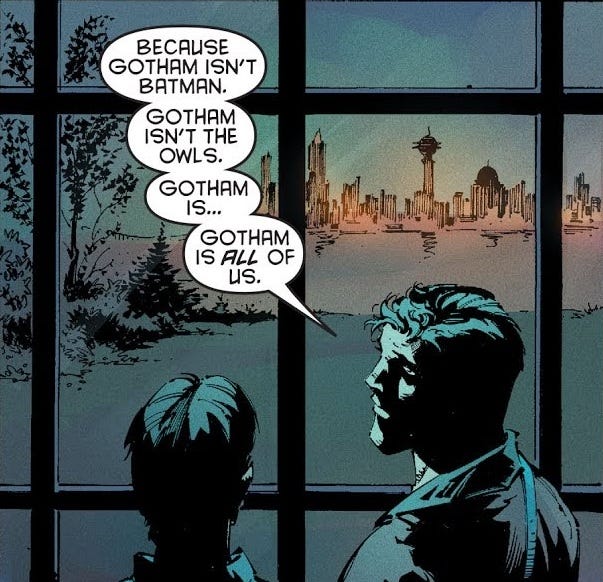




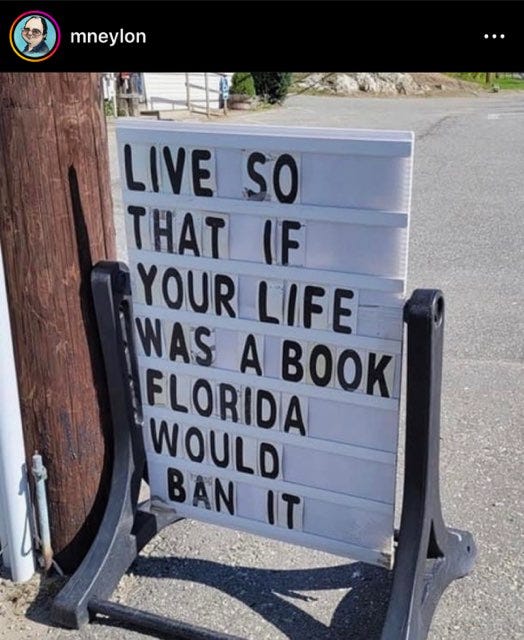

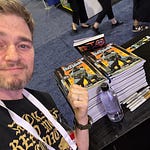
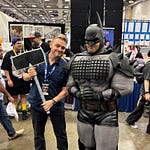


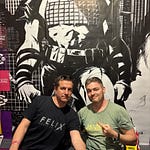
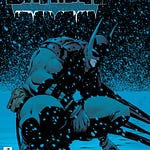
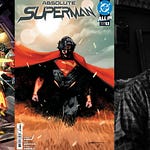
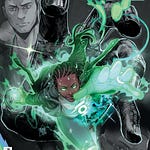
Share this post